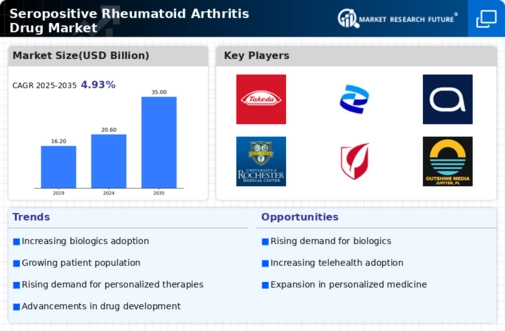Market Share
Seropositive Rheumatoid Arthritis Drug Market Share Analysis
Market dynamics in the seropositive RA drug market are influenced by factors such as prevalence, demographics of patients and competition. Better understanding of seropositive RA and advances in diagnostic technologies have resulted in early and accurate diagnosis which is driving demand for effective treatment measures. Also, healthcare provider-researcher-patient advocacy group collaborations are crucial in determining research priorities while making sure that patient voices form a basis for drug development process.
There is an increasing emphasis on improving clinical outcomes while at the same time enhancing overall well-being among people living with sero-positive Rheumatoid arthritis which makes it central point in this sphere. Patient-centered approaches encompass holistic care taking into account all aspects of life for one with sero-positiveRA; physically, emotionally and socially inclusive. This entails supportive services, educational initiatives as well as community engagement efforts towards developing a more comprehensive ecosystem that is favorable to patients.
Still there are several challenges facing sero-positive RA drug market including need for easy accessible affordable therapies; reduction of treatment related side effects and addressing long term consequences due to this ailment. Ongoing studies aim at unmasking complexities underlying SRAP and identifying therapy targets that offer sustained benefits with minimal adverse effects.
In the Rheumatoid Arthritis (RA) Drugs that are Seropositive market, companies have to adopt a number of strategies in order to create and expand their market shares given the dynamic nature of this landscape. One of the best techniques is differentiation where firms invest in developing innovative medicines that offer unique healing benefits. Many attempts are made in making drugs that do not only relieve symptoms but also target specific molecular pathways hence providing unique value proposition for patients as well as healthcare providers.
Strategic partnerships and collaborations form a critical base for establishing inroads into the Seropositive RA Drug Market. These alliances mostly consist research institutions, academic centers or other pharmaceutical firms that pool resources, share information and hasten drug development process respectively. Additionally; they can combine different core competencies thus enhancing overall capabilities thereby leading to more creations of innovative drugs.
Organizational positioning on market share depends on marketing and promotion strategies used by players within seropositive RA drugs market. Effective communication strategies can influence both patients and healthcare professionals when it comes to evaluating product effectiveness, safety and uniqueness. Such initiatives include continuous education campaigns involving holding medical conferences as well targeted advertisements aimed at creating awareness about their products thereby gaining trust from the customers.
Regulatory strategies are often employed before any organization crosses complicated drug development path to reach markets’ approval threshold. Therefore, majority of these organizations focus on strategic maneuvering than regulatory processes so as to get permission for seropositive RA drugs right on time. Fast-track status plus priority review designation facilitate faster completion of regulatory process allowing such companies bring their drugs into the market earlier than competitors do giving them competitive advantage.
Market positioning requires post-market surveillance and generation of real-world evidence. Thus any company that actively monitors long term safety along with efficacy evidences based on real world data collection is committed towards ongoing patient care. Hence it means that healthcare providers should strictly adhere to while treating their patients at all the times; these patients can have trust in them further enhancing their reputation within the market.


















Leave a Comment